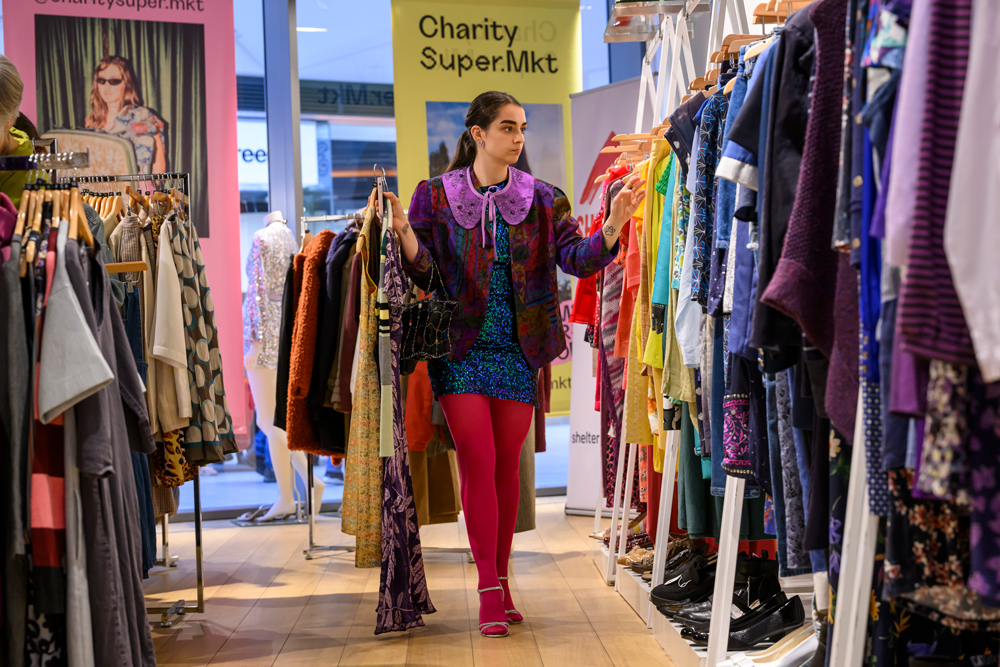
- New Ecover research finds over eight in ten Brits are troubled by the volume of clothing ending up in landfills
- Almost three-quarters (70 percent) claim it is important to them to shop for second-hand clothes and donate garments as a way to help reduce garment waste and minimise environmental impact
- Over 3 in 5 (63 percent) of shoppers said clearer hygiene and cleaning standards would increase their likelihood of purchasing pre-loved clothing, however, one in four (26 percent) do not wash clothing before donating them
- Almost 9 in 10 (87 percent) of Brits agree that donors should ensure their donations are in good condition for resale, however, 14 percent admit that they have donated something that they knew was not appropriate for resale
Ecover, a pioneer of laundry and cleaning products, has announced a strategic partnership with the UK’s first-ever multi-charity shop, Charity Super.Mkt, to help tackle fashion waste by encouraging people to donate and buy pre-loved clothing, and to inspire consumers to wash new life into old clothes.
The news of the partnership follows fresh new research conducted by Ecover, which reveals that over eight in 10 Brits (81 percent) are troubled by the volume of clothing ending up in landfills. Additionally, seven in ten Brits say that shopping for second-hand clothing and donating garments is important to them as a way to help reduce environmental impact.
91 percent of Brits have donated clothes in the past year. Ecover’s survey of UK adults revealed that the main motivations for donating are to “give clothes a second life” (57 percent), to “help raise funds for the charity” (53 percent) and to “declutter” (51 percent). Interestingly, charity-shop donors are more likely to engage in other sustainable practices than non-donors, such as recycling, and using reusable bags, water bottles and coffee cups.
Despite the positive trend for circular fashion and rising demand for second-hand clothing, there is ongoing uncertainty about donation quality. While nearly nine in ten UK adults surveyed agree that donations should be in good condition for resale, 14% admit to donating items that are not suitable, and 26 percent do not wash clothing before donating. These practices highlight the need for better hygiene standards and donation practices.
The partnership between Ecover and Charity Super.Mkt aims to tackle these issues by raising awareness about proper donation practices and improving donation quality, while also extending the lifespan of garments. Ecover will focus on how its products can help to rejuvenate old clothes and promote sustainable habits, such as effective washing and garment care. Together, they will work to educate people on the benefits of pre-loved clothing and provide practical advice for maintaining these items. By encouraging people to wash right, wear more, and waste less, the initiative promotes sustainable fashion habits that help keep clothing out of landfills and in circulation for longer.
Looking at purchasing trends, Charity Super.Mkt has identified September as the peak month for charity shop sales, driven by students with fresh loans, holiday returns, and back-to-school shopping. In contrast, sales dip in December as shoppers tend to favour new items for Christmas gifts and personal treats.
To meet growing demand and enhance the shopping experience, Charity Super.Mkt is calling for donations of more high-quality clothing and well-known brands. This aligns with the 74 percent of non-charity shop shoppers who say they’d be more likely to purchase from charity shops if the clothing were of higher quality.
Additionally, men are currently 14 percent less likely than women to purchase clothes from charity shops, indicating a potential gap in engagement with sustainable fashion practices. The need for more menswear donations is crucial to broaden selection and attract male shoppers, encouraging greater male participation in the circular clothing economy.
Wayne Hemingway MBE, co-founder of Charity Super.Mkt commented: “Our mission is to make second-hand shopping a mainstream choice and educate people on the importance of donating high-quality, clean clothing to charity retailers across the UK whether it be direct to charity stores, clothing banks or through innovative home collection services. We want to ensure donors know that stained or damaged items can’t be resold and, therefore, don’t support worthy causes. We encourage them to donate with care. This partnership with Ecover is key to supporting fashion circularity and providing shoppers with even greater confidence in second-hand options.
Clothing that isn’t suitable for donation shouldn’t be thrown away; it can be recycled into padding, cleaning cloths, or industrial blankets. Some pet homes may also accept it for bedding. Check your local council’s website, as many offer textile recycling services and provide information on textile banks.”
While more Brits are open to shopping second-hand, the research found that nearly three-quarters of non-buyers (71 percent) cite hygiene concerns as the main barrier, compared to 59 percent of current second-hand shoppers. And despite the rising popularity of shopping second-hand, some stigmas still remain with 54 percent of consumers quoting clothing in poor condition as a contributing factor, and 43 percent citing shops or clothes having a bad odour. To address these challenges and help ensure donations and purchases are in optimal condition, Ecover’s laundry products offer a practical solution to help inject new life into old clothes, helping remove stains and ensuring garments are fresh and ready to wear.
An Ecover spokesperson added: “Charity Super.Mkt is doing incredible work to advance the circular economy in fashion, and we’re proud to support this cause as we both share a mission to reduce fashion waste. We want to inspire and help people to live less wasteful lives, and this partnership allows us to empower the public to make more informed choices in both their shopping habits and laundry routines.”
The partnership builds on Ecover’s ongoing “Laundry Against Landfill” campaign, which seeks to educate consumers on reducing waste through better laundry habits.
The research was commissioned by Ecover in August 2024, with a sample size of 2,000 UK adults aged 18 and over.







